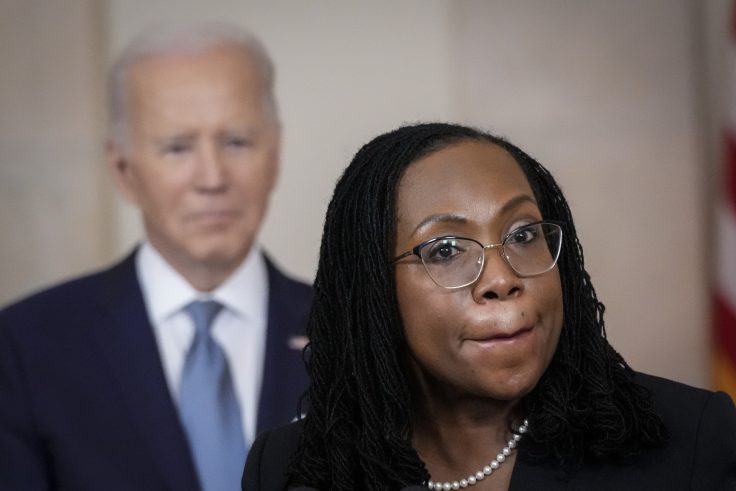Supreme Court nominee Judge Ketanji Brown Jackson will face ethics questions about her ties to left-wing public relations professionals, and a conflict of interest that could trigger her recusal from a landmark affirmative action case.
Jackson, whom President Joe Biden nominated Friday, has come under fire following a report that she retained PR gurus with deep ties in Democratic politics to assist with her prospective nomination. And Jackson's service on one of Harvard University's governing boards will prompt questions as to recusing herself from a lawsuit accusing the university of bias against Asians in admissions, which the High Court will hear this fall.
Republicans are still fine-tuning a response to Jackson's nomination. Beyond the ethics items, the nationwide spike in violent crime could play a major role in Republican maneuvering around her nomination. Jackson has deep experience in the criminal justice system as a former trial court judge and commissioner on the U.S. Sentencing Commission, a panel that offers guidance on criminal penalties.
Just hours before Biden officially nominated Jackson, Sen. Chuck Grassley (R., Iowa) sent a letter to Chief Judge Sri Srinivasan pressing for details about Jackson's work with PR operatives Robert Raben and TJ Ducklo. Raben and Ducklo are Democratic loyalists who, according to a Feb. 16 Politico report, helped ward off attacks on Jackson and connected reporters with the judge's allies during the selection process.
"It would be unusual, if not unique, for a candidate to enlist political communicators to assume this role," Grassley's letter reads.
Grassley is the ranking Republican on the Senate Judiciary Committee and Srinivasan is chief judge of Jackson's court, the U.S. Court of Appeals for the D.C. Circuit.
It's typical for judges jockeying for the Supreme Court to mobilize a volunteer network of ex-colleagues and former clerks to background reporters, lobby decision makers, and assist with nomination logistics. Those personnel, given their working relationship with the judge, are best positioned to speak to the judge's body of work, their personal characteristics, and their likely profile as a justice.
PR professionals from partisan Washington, D.C., outfits lack that kind of subject matter expertise and knowledge about the prospective nominee. As such, Republicans want to better understand what Raben and Ducklo were doing on Jackson's behalf, particularly if they seeded negative stories about her rivals in the press. One of Jackson's ex-law clerks edited Wikipedia entries for the judge's two main rivals early in the selection process, according to Politico. The edits meant to paint both contenders as more moderate than Jackson, seen as a progressive stalwart.
Grassley's letter also asks whether Raben and Ducklo coordinated with the D.C. Circuit's media relations office. Ducklo, a former White House press aide, resigned in February 2021 following reports that he threatened a female reporter.
Apart from the messaging dust up, Jackson will also face ethics and recusal questions related to a lawsuit that alleges that Harvard discriminates against Asian students in admissions. The High Court will hear that case later this year, and the plaintiffs are urging the justices to ban consideration of race in college admissions altogether.
Jackson serves on Harvard's Board of Overseers, one of the university's two governing boards. The board plays "an integral role in the governance of the university," through quality control, strategic advice, and external assessments of various departments, according to Harvard's website.
Recusal decisions are ultimately up to the justices themselves, who are not formally bound by an ethics code. Jackson may be able to distance herself from the controversy, such that she could participate, if she played no role in crafting or advising on admissions practices as an overseer. Recusal is also appropriate where there is reason to question a justice's partiality, but such arguments are often entangled with partisan agendas.
Solicitor general Elizabeth Prelogar, the Biden administration's top Supreme Court lawyer, obtained special authorization from the White House counsel and a senior Justice Department official to participate in the Harvard case despite a conflict of interest. Prelogar is a former university employee, having taught a class at Harvard Law School on appellate advocacy. Ethics rules required Prelogar to recuse from the case absent a waiver, and an oversight group is pressing for more information about the administration's decision to grant one.
The Harvard lawsuit will also supply Republican lawmakers with ample questions for the judge. The plaintiffs, an anti-affirmative action group called Students for Fair Admissions, used Harvard's own internal data to show Asian applicants inexplicably score lower than all other racial groups on the university's subjective personal evaluation. The personal score is one of four domains the university weighs in the admissions process.
The plaintiffs say the scoring outcomes reveal a pervasive "model minority" bias against Asians at Harvard. They also note Harvard's office of institutional research flagged the personal scoring disparity almost a decade ago, but the admissions office made no changes to its policy.
Those facts and many others offer Republican senators numerous avenues to pursue, given Jackson's leadership role at Harvard.
